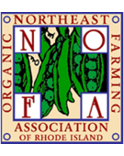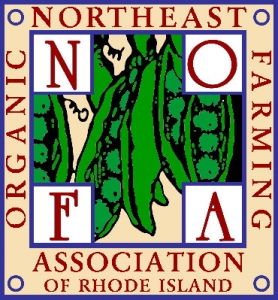NOFA Rhode Island is an organization of farmers, gardeners and consumers working to promote organic farming and land care practices.
Formed in 1990, the Northeast Organic Farming Association of Rhode Island (NOFA/RI) is an organization of farmers, consumers, gardeners and environmentalists working to promote organic farming and land care practices. NOFA/RI fosters a healthy relationship to the natural world through farmer-to-farmer education, advocacy and technical assistance. We work to increase the acres of sustainably and organically managed land and to provide access to local, organic food for all Rhode Islanders. NOFA/RI is affiliated with other NOFA chapters through the NOFA Interstate Council.
NOFA History
The Natural Organic Farmers Association (NOFA) was formed in Vermont and New Hampshire in 1971.The Maine Organic Farmers and Gardeners Association (MOFGA) was established in the early 1970s. Massachusetts, Connecticut and New York started NOFA chapters in 1982. Rhode Island and New Jersey NOFA chapters were created later. NOFA and MOFGA have been powerful advocates for organic agriculture and sustainable practices for over 40 years.
In 1989, NOFA changed its name to the Northeast Organic Farming Association. By then the term “Natural” was overused. Changing “Farmers” to “Farming” welcomed in the broader food and ag community.
Today, NOFA is a growing regional coalition representing about 5,600 farmers, farm workers, apprentices, gardeners, chefs and consumer members.
NOFA Interstate Council
The Interstate Council (NOFA-IC) is a seven-member coalition of state chapters representing farmers, gardeners and consumers. The council allows state NOFAs to collaborate beyond state lines, work together on joint projects and build the capacity of each chapter to serve their members.
The Interstate Council also advocates for regional and national policies that support organic growers and produces The Natural Farmer, a quarterly newspaper with features on organic farming techniques, certification issues, organic market conditions and relevant policy and environmental developments.
Learn more about the NOFA Interstate Council at nofa.org or email administrator@nofa.org.
What is Organic Agriculture?
Health, Ecology, Fairness, and Care are the roots from which organic agriculture grows and develops. They express the contribution that organic agriculture can make to the world, and a vision to improve all agriculture in a global context.
Principle of Health
Healthy soil, plants, animals, humans = a healthy planet.
Organic agriculture should sustain and enhance the health of soil, plant, animal, human and planet as one and indivisible. Health is the wholeness and integrity of living systems. It is not simply the absence of illness, but the maintenance of physical, mental, social and ecological well-being. Immunity, resilience, and regeneration are key characteristics of health.
Principle of Fairness
Equity, respect and justice for all living things.
Organic agriculture should build on relationships that ensures fairness at all levels and to all parties – farmers, workers, processors, distributors, traders and consumers. Organic agriculture should provide everyone involved with a good quality of life, and contribute to food sovereignty and reduction of poverty.
Principle of Ecology
Emulating and sustaining natural systems.
Organic agriculture should be based on living ecological systems and cycles, work with them, emulate them and help sustain them. Organic management must be adapted to local conditions, ecology, culture and scale. It aims to design systems that can feed people, reduce external inputs, contribute to biodiversity, and benefit our common environment.
Principle of Care
For the generations to come.
Organic agriculture should protect the health and well-being of current and future generations and the environment. Management decisions can enhance efficiency and increase productivity, but this should not be at the risk of jeopardizing health and well-being. Decisions should reflect the values and needs of all who might be affected, through transparent and participatory processes.
NOFA Top Priorities for Member Engagement | 2023 Farm Bill
April, 2023
Expand Opportunities in Organic
The forthcoming Opportunities in Organic Act offers a suite of flexible, easy-to-access tools to reduce barriers to organic agriculture, including for Black farmers, Indigenous farmers, farmers of color, and producers historically excluded from organic certification. It will modernize reimbursements for organic certification, increase technical expertise and support within public institutions and NGOs and expand support for producers transitioning to organic.
Source/more info:
Demand Climate Action
The Agriculture Resilience Act will harness the power of agriculture to confront our climate and biological crises. With urgent action now, including the investments and policy reforms in the ARA, we can meet our climate goals and dramatically improve our food system while engaging farmers in making the critical changes necessary for our future.
Support Organic Dairy
Immediate support to address dramatically increased organic input costs for organic dairy farms is urgently needed to reverse the alarming decline in family organic dairy farms in the northeast. Organic Farmers Association’s priorities for organic dairy will increase organic milk market transparency by requiring AMS to publish organic-specific data, invest in local infrastructure and ensure that disaster relief efforts support the specific needs of organic dairy farms. Systemic reforms such as those detailed in the Milk from Family Dairies Act are also needed to ensure farm viability and market opportunities for all family dairies.
Secure Equitable Access to Land and Credit
USDA has a demonstrated history of discriminating against Black, Indigenous, and farmers of color in lending and credit practices and program implementation. Our nation must take action now to facilitate secure, affordable access to land and access to credit for young farmers and farmers of color—there is no time to wait. The reforms in the Justice for Black Farmers Act are needed to address and correct discrimination against Black farmers in farm technical assistance and lending programs and to ensure representation on county FSA committees.

